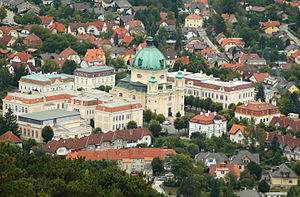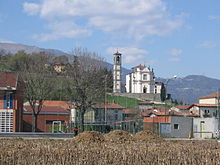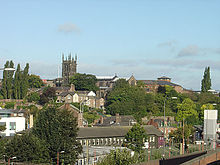- Parish
-
This article is about ecclesiastical administration. For the administrative or civil parish, see Parish (administrative division). For other uses, see Parish (disambiguation).
A parish is a territorial unit historically under the pastoral care and clerical jurisdiction of one parish priest, who might be assisted in his pastoral duties by a curate or curates - also priests but not the parish priest - from a more or less central parish church with its associated organization. It often covered the same geographic area as the manor, under the lay jurisdiction of the Lord of the Manor, which generally shared the same name and from the creation of which the parish may have derived its existence.
By extension the term parish refers not only to the territorial unit but to the people of its community or congregation as well as to church property within it. In England this church property was technically in the ownership of the parish priest, vested in him on his institution to that parish.
Contents
Etymology and use
From the Greek paroikia, the dwellingplace of the priest, eighth Archbishop of Canterbury Theodore of Tarsus (c.602–690) applied to the Anglo-Saxon township unit, where it existed, the ecclesiastical term parish.
First attested in English late 13th century, the word parish comes from the Old French paroisse, in turn from Latin: paroecia,[1] which is the latinisation of the Ancient Greek: παροικία} paroikia, "sojourning in a foreign land",[2] itself from πάροικος (paroikos), "dwelling beside, stranger, sojourner",[3] which is a compound of παρά (para), " beside, by, near"[4] + (oikos), "house".[5]
Being an ancient concept the term "parish" is used by all the long established Christian denominations: Roman Catholic, Anglican Communion, the Eastern Orthodox Church, Lutheran churches, and some Methodist, and Presbyterian churches.
Church territorial structure
- A chapelry is a subdivision of a parish to cope with difficult access
- A parish is a subdivision of a diocese or see. The diocese is headed by a bishop
- An archdeaconry is another subdivision of a diocese, it is a group of parishes
- A diocese is a subdivision of a province. The province is led by a metropolitan bishop
- A province may cover all or part of a country or a group of countries and be presided over by an archbishop who is Primate
Roman Catholic Church
In the Roman Catholic Church, each parish has at least one parish priest, who has responsibility and canonical authority over the parish (the Latin for this post is parochus).
A parish priest may have one or more fellow priests assisting him. In Catholic usage this priest is technically a "parochial vicar", but is commonly called an "associate pastor" or "assistant pastor" (or just "associate" or "assistant"), a curate, or vicar - common as they are, these terms are inaccurate and many dioceses have recently begun using the canonical term "parochial vicar" even in general parish communications (bulletins and the like).
Each diocese (administrative region) is divided into parishes, each with their own central church called the parish church, where religious services take place. Some larger parishes or parishes that have been combined under one pastor may have two or more such churches, or the parish may be responsible for chapels (sometimes called "chapels of ease") located at some distance from the parish church for the convenience of distant parishioners.
In the Catholic Church there also exists a special type of ecclesiastical parish called a national parish, which is not territorial in nature. These are usually created to serve the needs of all of the members of a particular language group, particularly of an immigrant community, in a large area: its members are not defined by their precise location, but by their country of origin or native language.
Other variations are also possible. In some Catholic jurisdictions created for the armed forces, for instance, the entire diocese or archdiocese is treated as a single parish: all of the Catholics in the military of the United States and all of their Catholic dependents, for instance, form the Archdiocese of the Military Services, USA, a diocese defined not by territory but by another quality (in this case, relationship to the military) - this archdiocese has its own archbishop, and all records and other matters are handled in a central office rather than by individual priests assigned to military post chapels or chaplains of units in the field.
- See also:Team of priests in solidum
Church of England
See also: Parish (Church of England), Church of England#Structure, and Church of England parish churchThe Church of England at its heart views the local parish church as the basic unit.
The parish system of the Church of England survived the Reformation largely untouched so shares its roots with the Roman Catholic system described above. See secession from Rome One parish may have been situated in different counties or hundreds and in many cases parishes contained in addition to its principal district several outlying portions, usually described as 'detached', intermixed with the lands in other parishes. Church of England parishes are currently each within one of 40 dioceses divided between the provinces of Canterbury, 28 and York, 12.Each parish should have its own parish priest (who might be termed its vicar or its rector), perhaps supported by one or more curates or deacons - although as a result of ecclesiastical pluralism some parish priests might have held more than one parish living, placing a curate in charge of those where they did not reside. Now, however, it is common for a number of neighbouring parishes to be placed in the charge of a single vicar who takes services at them in rotation, with additional services being provided by lay readers or other non-ordained members of the congregation.
In England Civil parishes and their governing parish councils evolved in the 19th century as ecclesiastical parishes began to be relieved of what became considered to be civil responsibilities. Their separate boundaries began to vary. The word "parish" acquired a secular usage. Since 1895, a parish council elected by the general public or a (civil) parish meeting administers a civil parish and is the level of local government below a district council.
The traditional structure of the Church of England with the parish as the basic unit has been exported to other countries and churches within the Anglican Communion but is not necessarily administered in the same way.
Church of Scotland
In the Church of Scotland, the parish is basic level of church administration. The spiritual oversight of each parish church is responsibility of the congregation's Kirk Session. Patronage was regulated this way in 1712 (Patronage Act) and abolished in 1874, ministers must be elected by members of the congregation. Many parish churches are now "linked" with neighbouring parish churches (served by a single minister.) With the abolition of parishes as a unit of civil government in Scotland, parishes now have a purely ecclesiastical significance in Scotland (and the boundaries may be adjusted by the local Presbytery).
Methodist Church
Although they are more often called simply congregations and have no geographic boundaries, in the United States some United Methodist Church congregations are called parishes. The United Methodist Bishop of the Episcopal Area appoints a pastor to each congregation. The same is true in the African Methodist Episcopal Church and the Christian Methodist Episcopal Church.
In New Zealand, a local grouping of Methodist churches that share one or more ministers (which in the United Kingdom would be called a circuit) is referred to as a parish.
ISKCON
The parallel to the parish system in the International Society of Krishna Consciousness is the division of zonal areas by the Governing Body Commission.
See also
- Parish church
- Parish registers, Birth certificate, Marriage certificate, Death certificate
- Parish pump
- Freguesia
References
- Notes
- ^ paroecia, Charlton T. Lewis, Charles Short, A Latin Dictionary, on Perseus
- ^ παροικία, Henry George Liddell, Robert Scott, A Greek-English Lexicon, on Perseus
- ^ πάροικος, Henry George Liddell, Robert Scott, A Greek-English Lexicon, on Perseus
- ^ παρά, Henry George Liddell, Robert Scott, A Greek-English Lexicon, on Perseus
- ^ οἶκος, Henry George Liddell, Robert Scott, A Greek-English Lexicon, on Perseus
- Bibliography
- Sidney Webb, Beatrice Potter. English Local Government from the Revolution to the Municipal corporations. Publisher: Longmans, Green and Co., 1906
- James Barry Bird. The laws respecting parish matters: containing the several offices and duties of churchwardens, overseers of the poor, constables, watchmen, and other parish officers : the laws concerning rates and assessments, settlements and removals of the poor, and of the poor in general. Publisher W. Clarke, 1799
External links
- In praise of ... civil parishes Editorial in The Guaurdian, 2011-05-16.en:堂区
Categories:- Anglicanism
- Christian group structuring
- Roman Catholic Church organisation
- Church parishes
- Christian terms
- Greek loanwords
Wikimedia Foundation. 2010.



